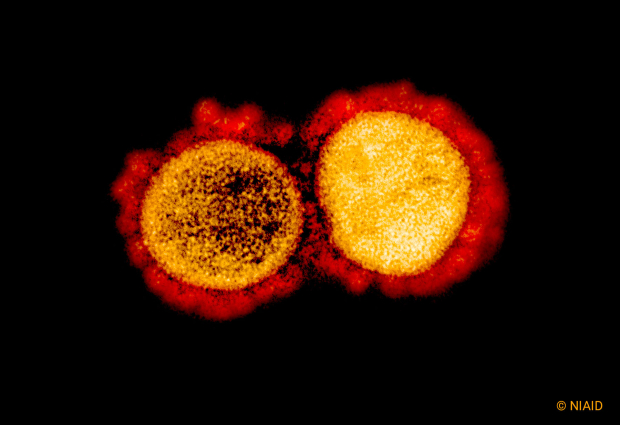
COVID-19
Having appeared in Wuhan, central China, in December 2019, the SARS-CoV-2 coronavirus spread throughout the world very quickly.
Published on 12 March 2024
In brief
Having appeared in Wuhan, central China, in December 2019, the SARS-CoV-2 coronavirus spread throughout the world very quickly. Infection with this virus causes respiratory disease that is sometimes severe and which can have health consequences in the medium to long term.
Since its appearance, SARS-CoV-2 has caused over 670 million cases of COVID-19 and 6.8 million deaths, according to Johns Hopkins University. Researchers rapidly mobilised to understand this novel virus and its transmission, and to develop diagnostic tests, treatments and vaccines. During the crisis, our agency facilitated, evaluated, coordinated and funded French research into COVID-19. The emergence of variants of SARS-CoV-2, whose characteristics are likely to modify the dynamics of the epidemic and the response to treatments or vaccines, has highlighted the essential role of genome surveillance. To address these challenges, we are coordinating two major projects: EMERGEN in France and AFROSCREEN in 13 countries of Africa. The phenomenon of long COVID is the subject of a workgroup and several calls for proposals.

Consult the COVID-19 Emergence Unit
Publications
- Planchais C, et al. Potent human broadly SARS-CoV-2-neutralizing IgA and IgG antibodies effective against Omicron BA.1 and BA.2. J Exp Med. 2022.
- Fenwick C, et al. Patient-derived monoclonal antibody neutralizes SARS-CoV-2 Omicron variants and confers full protection in monkeys. Nat Microbiol. 2022.
- Marlin, RD, et al. Antiviral Efficacy of Favipiravir against Zika and Sars-Cov-2 Viruses in Non-Human Primates. Nat Commun. 2022.
- Colosi E., et al. Screening and vaccination against COVID-19 to minimise school closure: a modelling study. Lancet Infect Dis. 2022.
- Ndongo FA, et al. Rapid Increase of Community SARS-CoV-2 Seroprevalence during Second Wave of COVID-19, Yaoundé, Cameroon. Emherg Infect Dis. 2022.
- Grant R, et al. Impact of SARS-CoV-2 Delta variant on incubation, transmission settings and vaccine effectiveness: Results from a nationwide case-control study in France. Lancet Reg Health Eur. 2022.
